07 May 2010
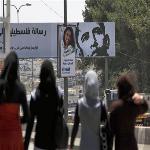
Photo: AP
Palestinian girls walk near a billboard with a picture of US President Barack Obama, in the West Bank city of Ramallah.
Opinion polls have shown that President Barack Obama's widely-publicized speech in Cairo last June calling for improved U.S. relations with the Muslim world raised public expectations for such an outcome.
But nearly one year after the speech, those public hopes could turn into disappointment - especially with regard to Middle East peace - unless the Obama Administration begins delivering on some of its Cairo promises.
That's the view of scholars at a recent symposium at the Center for the Study of Islam and Democracy in Washington, D.C.
One year later
The center's symposium was called U.S. Relations with the Muslim World: One Year after Cairo. Its goal was to evaluate the current state of that relationship, and discuss the most effective ways President Obama can fulfill his Cairo promises.
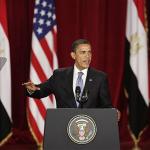
ASSOCIATED PRESS
On June 4, 2009, U.S. President Barack Obama speaks at Cairo University in Cairo, Egypt. (AP Photo/Ben Curtis/file)Steven Kull, director of the center's Program on International Policy Attitudes, noted there has been some improvement in how Muslims view the U.S. since President Obama took office.
But he said there is still a lot of anger towards America, especially regarding the Israeli-Palestinian conflict.
"There is always an interest in the U.S. changing its policies relative to Israel and putting more pressure on Israel." said Kull. "But in the broader sense, they are looking for the U.S. to play a less dominating role."
Even in a country as far from the Middle East as Nigeria, solving the Israeli-Palestinian conflict seems to be the number one promise Muslims in the west African state think President Obama should fulfill.
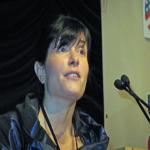
VOA - M. Elshinnawi
Chloe Berwind-Dart, director-general of the Nigerian development group Cherish Foundation, says the Israel-Palestine conflict represents an open wound for the Muslim majority in Nigeria.'Open wound'
Chloe Berwind-Dart is director-general of the Nigerian development group Cherish Foundation.
"So long as that crisis continues to burn and we have not yet reached the two-state solution with self determination for everyone involved, that will continue to be a huge point of tension."
Berwind-Dart said this conflict represents an open wound for the Muslim majority in Nigeria, where there is a realization that Obama's good intentions alone are not enough to deliver a two-state solution.
As the U.S. State Department's Special Representative to Muslim Communities, Farah Pandith has spoken with Muslims around the world.
In virtually all those conversations, she told the conference, people called the Israeli-Palestinian conflict their primary concern. While she acknowledged the difficulty of reaching a two-state solution to that long-running divide, Pandith said that has been a priority for the Obama administration from the very beginning.
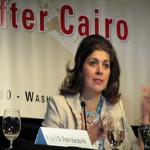
VOA - M. Elshinnawi
Farah Pandith is the U.S. State Department's Special Representative to Muslim Communities.US dedication
"The dedication of the president and the secretary of state on the Israel-Palestinians issue is very important, we have an envoy to the Middle East who is dedicated to this issue 24/7 and certainly we all heard the commitment from the president from day one on the Issue," said Pandith.
The knowledge that President Obama is personally backing efforts to settle the Israeli-Palestinian conflict is resonating with young people in the Arab world.
Moataz Fattah, a political science professor at Cairo University, said his survey of America's image among Arab youth shows that the younger generation sees good prospects for improving U.S relations with the Muslim world.
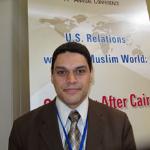
VOA - M. Elshinnawi
Cairo University Professor Moataz Fattah's survey of America's image among Arab youth found they're optimistic about improving U.S relations with the Muslim world."For sure his efforts are applauded," said Fattah, "but it is expected from him to work harder even though they know that the odds are against his efforts - especially with Netanyahu's emphasis on continuing to build the settlements."
Other scholars at the conference said one year is too soon to expect results. They suggest that real changes in U.S. policy in the Middle East could take place toward the end of Obama's first term or during his second term - if he is re-elected president.